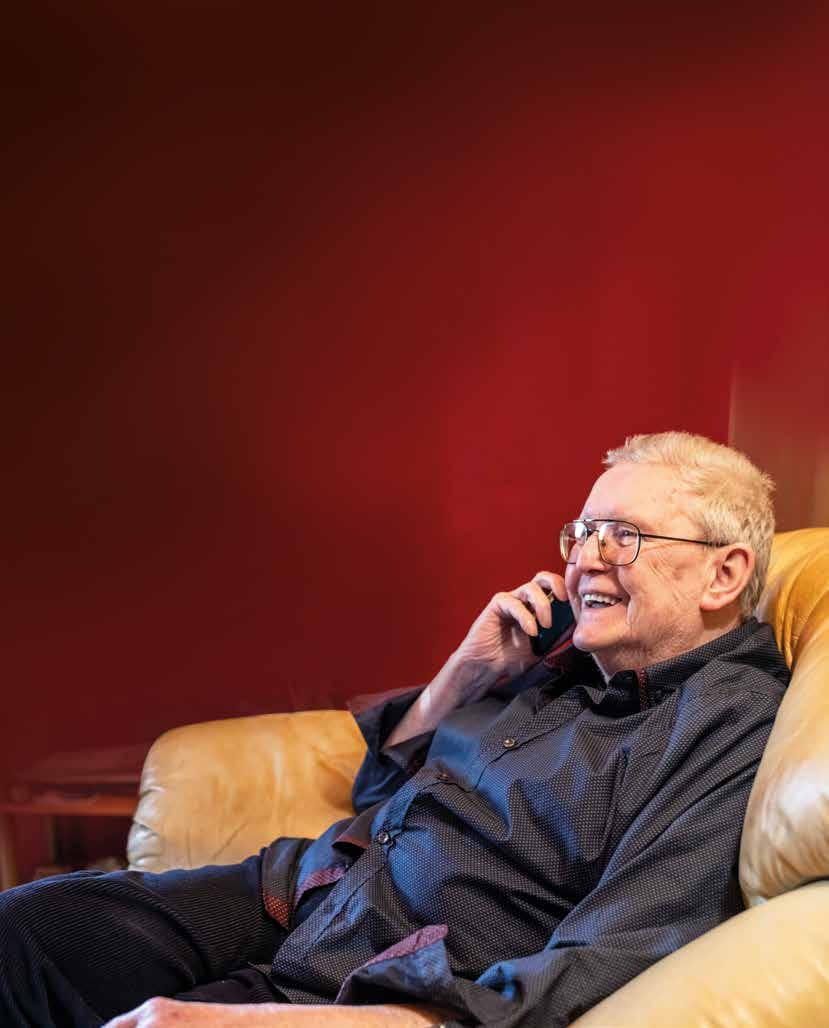

POWER OF A BLETHER Staying
connected this winter

George has prepared every song for his send-off. More importantly, he’s set up his funeral plan with Golden Charter. So when the time comes, his family won’t have to worry about funeral arrangementsor his send-off soundtrack.
n Plans start from just £1,885
n Payments are fully protected by the Financial Services Compensation Scheme
n Funeral director costs will be fixed at today’s prices
n Whether you want a simple direct cremation or a more traditional send-off, Golden Charter has a plan to suit you
n Your family will have the support of a local, independent funeral director


Contents
P6 “I’m so glad you called”–insights from a friendship caller volunteer
P8 Play our new Weekly Lottery to support community groups
P10 Tips to save energy this winter
P14 Drumroll please… our award winners are…
P19 Breaking down barriers in dementia
P20 Read all about it - new information guides available
P21 Why we still need Pride in 2025
P22 Let’s talk menopause in the workplace
P26 Staying creative with age
P28 Enjoy a brain workout

Welcome to your winter edition of Advantage
It’s that time of the year again when we are stocking up on Quality Streets and getting ready to watch Christmas repeats on the television. However, we’re very aware that winter can be an extremely tough time for our readers –with many struggling to heat their homes amid spiralling energy costs, food prices soaring and many finding the festive period the loneliest time of the year.
Age Scotland is the Scottish charity for older people. Our magazine, Advantage, provides information, inspiration and ideas to empower Scotland’s older people and their friends, families and carers.
If you have news, events or issues that you would like Advantage to cover, please get in touch. We also welcome ideas on how we might improve the magazine. To stop receiving Advantage, please get in touch with us via the details below.
advantage@agescotland.org.uk
0333 323 2400
Advantage, Age Scotland, Causewayside House 160 Causewayside, Edinburgh EH9 1P
ISSN 1747-4515
In this edition of Advantage, we explore the power of a blether and staying connected. We also get top tips from our energy advisers on how to save energy and money this winter (page 10/11) and find out about the new Winter Heating Payment (page 12/13).
In October, we celebrated the hard work and dedication of individuals, groups and organisations who make a positive difference to the lives of older people at our awards ceremony in Perth. Find out who the deserving winners were on page 14-16.
As we approach a new year, we look forward to new beginnings but it’s also a time for reflection. Sadly, we lost two of our dear friends this year — Sir Geoff Palmer, a highly distinguished scientist and academic, former trustee of Age Scotland and an active member of the Scottish Ethnic Minority Older People Forum — and TV star Glen Michael, a key voice on our loneliness campaign and ambassador for our friendship service. Both made a significant contribution to the lives of older people and their impact, and legacy will resonate for generations.
Wishing you all a happy and healthy 2026 when it comes, and as always, please get in touch with any news about the great work going on across Scotland for older people.

Katherine Crawford, Chief Executive
Katherine Crawford
The most lonely time of the year
Across Scotland, on every street, behind any door, you could find a lonely older person this winter.
This includes people like Alex, 72.
In 2007, Alex returned to his roots in Motherwell. He had no connections left in the town and soon felt isolated. “I’ve lived on my own since I came back to Scotland. I don’t have any family or friends around now. The reality is that so many people fall away from your life as you get older.”
Two years ago, Alex was at the doctor’s surgery where someone recommended that he give Age Scotland a call. He was referred to our Friendship Services and now receives a weekly call.
“I can’t tell you how much I look forward to Friday afternoons, when I have my weekly chat.
“Having someone to talk to reduces my anxiety about being lonely. It has been absolutely wonderful and made a big, big difference to my life.”
Other than his friendship calls from Age Scotland, Alex says the only people he speaks to on the phone are doctors, the dentist or the council.
“Last Christmas I got a friendship call on Christmas Day and it was brilliant. It was so lovely to have someone to talk to, someone who asked questions and was open to listening to me.
“For the past few years, I’ve been on my own at Christmas. You just get used to it. I’d put on that noisy thing in the corner – the TV – just to stop the silence.
“The weekly friendship call I get on a Friday sets me up for the whole weekend and leaves me feeling on top of the world. It makes the weekend not seeing anyone more tolerable.
“Getting these calls from Age Scotland has meant the world to me.”

“Getting these calls from Age Scotland has meant the world to me.”
Alex Wilson
Helping others to feel more connected
Our Health and Wellbeing officer, Rebekah Ballantyne, has identified simple steps you can take to help others feel more connected.
Share a compliment
If you’re thinking something kind about someone, share it! It might feel a bit embarrassing or unfamiliar at first - but it is likely to make you both smile and might really brighten both of your days.
Show gratitude
Say thank you and really mean it! Taking a moment to smile and share eye contact gives our brains a boost when we have microinteractions like this.
Offer help
If someone is struggling with something, e.g. lifting a shopping bag, offer to help. They might decline, but you will feel good for offering and your kindness will likely be paid forward.
Call a friend or send a message
We often think about people in our lives, even when we’ve not seen or spoken to them in a while. Letting them know that they are in your mind can make you feel closer and more connected.
Ask questions
Ask open-ended questions to spark conversation, like ‘anything interesting on today’ or ‘is your day going well’?

Do you need support?
Age Scotland’s Friendship Services are here for anyone in the older community struggling with loneliness. If you, or someone you know, needs a little support or just a friendly chat, call our free helpline on 0800 12 44 222. Our lines are open weekdays from 9am – 5pm.
Our Friendship Service is heavily supported by donations made to Age Scotland. If you’d like to help us provide friendship to more people like Alex this winter, please visit age.scot/donate today.
Rebekah Ballantyne
“I’m
so glad you called”–insights from a friendship caller volunteer
At Age Scotland, we’re lucky to be supported by a dedicated team of volunteers who help deliver our vital services to older people.
Jacopo Mancini kindly shares his experience volunteering with our friendship services:
In early 2020, I returned to Edinburgh after the holidays. I had just moved into my own flat — living alone for the first time in my life. It was a personal milestone, and I felt proud.
And then the world shut down when COVID-19 arrived. My grandmother passed away during lockdown. No visitors were allowed. I couldn’t even attend her funeral. A massive part of my childhood — of who I am — vanished.
Suddenly, I was alone in my flat, isolated, grieving — and it hit me how deeply loneliness can hurt. I thought about my grandmother, about the other residents in that care home, about all the older people, like my grandmother, who had lived full lives, raised families, built communities, achieved so much — only to end up forgotten, reduced to a name on a care rota. And I realised something that felt so profoundly unfair: that the older people we so easily overlook were once proud, accomplished, independent — just like I was in that moment. Just like we all hope to be.
We celebrate achievement when we’re young but often ignore it in the elderly. That disconnect, that injustice, stayed with me.

During lockdown all was closed. As a side hustle, I began caring part-time for an elderly woman in Edinburgh who had stopped leaving her flat during the pandemic. She lived in near-total isolation. We talked — about her life, her passions, music, philosophy. Eventually, when the company didn’t renew my part time role, I had to step back. That experience gave me clarity: I wanted to do more for older people. When the opportunity to volunteer with Age Scotland as a friendship caller came through my workplace, I didn’t hesitate.
During our weekly calls, we talk about everything — memories, music, animals, family, or simply how the day has been. I also recently became a Community Connector, and I help them find local activities, small sources of joy and connection.
The most rewarding part? Hearing the warmth in their voice when they say, “I’m so glad you called.”
Age Scotland’s Friendship Services are more than just phone calls. They’re bridges — ways to honour lives that have been full, rich, and often overlooked. They give meaning, not just to the people we support, but to us as well.
Every time I speak to someone, I carry my grandmother with me — her strength, her music, her wisdom. Volunteering is my way of honouring her, and all those like her whose voices still deserve to be heard.
“
Age Scotland’s Friendship Services are more than just phone calls. They’re bridges — ways to honour lives that have been full, rich, and often overlooked. They give meaning, not just to the people we support, but to us as well.”
Feeling inspired?
We’re always looking for volunteers to help support our Friendship Services. If you enjoy a chat and have a few hours free each week, we’d love to have you as part of the team.
Visit age.scot/volunteer

Our friendship volunteer, Jacopo Mancini, and his grandmother
Play our new Weekly Lottery to support community groups across Scotland
In September, we launched our new Weekly Lottery to support community groups across the country.
Players can take part for just £1 per week and will be in with the chance of winning weekly prizes ranging from £25 to £25,000. The draw is every Saturday night at 8pm when the 6-digit winning combination will be picked.
The money raised and received by Age Scotland from the lottery will support the charity’s network of over 500 community groups for older people across Scotland. Every ticket sold will help us support these groups, from the Shetland Islands to the Borders and everywhere in between!
Katherine Crawford, chief executive at Age Scotland, said:
“Our new lottery is a fun and exciting way to support Age Scotland and every ticket sold helps us support older people’s groups.
“These groups are a vital part of local communities, offering a wide range of activities and social events for people aged over 50, strengthening community connections, bringing people together and creating new friendships.
“By playing our lottery, you will be helping older people’s groups in your area deliver services and social activities to tackle loneliness and isolation.”

Chief executive Katherine Crawford (L) and colleagues celebrating our Lottery launch
Amy from Wing Hong Chinese Elderly Centre in Glasgow explained how Age Scotland support impacts their members’ lives:
“The support we’ve received from Age Scotland has been invaluable to Wing Hong — from dementia awareness training to providing publications in Cantonese for our service users. Their ongoing support truly reflects Age Scotland’s commitment to inclusivity and breaking down barriers.
“Age Scotland’s funding has directly supported our services, helping us reduce loneliness and isolation among older members of the Chinese community. With their help, we’ve been able to deliver culturally sensitive activities, offer bilingual advice, and create a warm and welcoming environment for those who need it most. Their partnership has made a lasting impact on the lives of our members.”
Visit age.scot/lottery or call 03300 253 035 to play.
Why play our lottery?
• You could win up to £25,000!
• Our tickets cost only £1.
• With fewer players than the big lotteries, you’ve more chance of winning a prize!
• Every ticket helps us support local community groups for older people across Scotland.
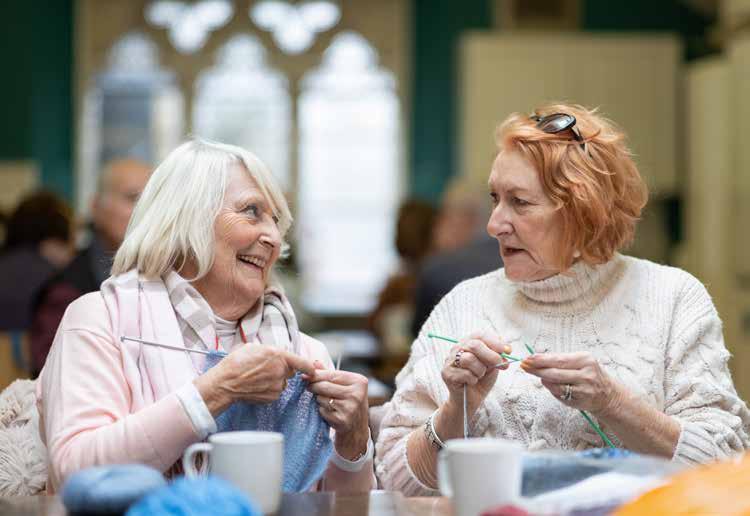
Our lottery funds will keep communities close-knit
Top tips to save money and energy this winter
Heating our homes to a comfortable level is essential for our health and wellbeing, especially during bitter Scottish winters.
Understanding your bills and reducing your power usage is more important than ever with rising energy bills, but it can be hard to know where to start.
Our friendly energy advisers, Simone and Shona, are here to offer their tips on saving energy and your wallet.
Cook smart

‘The kitchen is one of the biggest culprits for wasting energy and pouring money down the drain,’ says Simone.
Switch appliances off, like your microwave and electric oven, when they’re not in use rather than leaving them on standby and you could save around £45 annually. Turn your electric oven off 10 minutes before the end of cooking time – it will hold its temperature but make sure food still gets piping hot.
Boil only the amount of water you need when making hot drinks and use a cup to measure.
Draught-proof your home
Prevent energy loss by sealing air leaks, adding insulation, and using curtains or blinds to regulate temperature. Keep radiators clear –do not put large pieces of furniture in front of them or hang clothes on them to dry.
To arrange a free draught proofing assessment please call Care & Repair Edinburgh, part of the Age Scotland family, on 0131 337 1111 or visit www.cre.scot
Switch off lights
‘Not exactly a lightbulb moment but a quick way to save money and energy is to turn your lights off when you leave a room’, advises Shona.
Where you can, choose energy-efficient appliances and fixtures and replace all the lights in your home with LED bulbs. Most LEDs use at least 75% less energy, saving you a huge amount on your bill.
Our Warm and Well guide offers great tips on how to make your home energy efficient and stay warm for less. Read our guides at age.scot/information.
Wash wisely
Use your washing machine on a 30-degree cycle instead of higher temperatures and only run a cycle when the washing machine is full. Swapping a bath for a shower and taking shorter showers can also save a lot of energy.
For more information sign up to our free energy workshops at age.scot/workshops.

Understand your bill and entitlements
Now more than ever it is important for older people to claim all the benefits they are entitled to.
Energy bills are complicated, and it can be difficult to understand exactly what you are paying and how much energy you use.
Shona and Simone can carry out a full benefits check and help callers navigate the important parts of your bill and explain your home’s Energy Performance Certificate (EPC).
Find out more
If you’d like to chat about your energy bills or find out if you are entitled to financial support, please call our helpline on 0800 12 44 222 or visit age.scot/benefitscalculator.

Simone and Shona, Age Scotland’s energy rights advisors
Help for heating your home this winter
We actively campaigned against the widespread removal of the Winter Fuel Payment and urged the Scottish Government to step in and support older people on low and moderate incomes.
Responsibility for the devolved version of Winter Fuel Payment – the Pension Age Winter Heating Payment – falls to the Scottish Government this year and thousands of pensioners are set to benefit from the Payment to help with heating costs. We warmly welcomed the Scottish Government’s pledge to give a payment of £100 to all pensioners from winter 2025, with those on Pension Credit maintaining their £200 to £300 of support. However, for many pensioners on low and modest incomes, £100 will not go far enough to lift them out of fuel poverty.
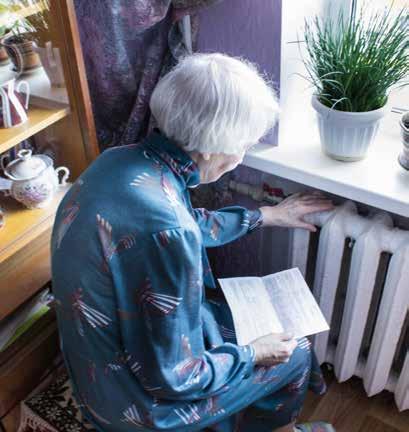
Useful information from Social Security Scotland
Eligible people of State Pension age will get a payment between £101.70 and £305.10 depending on their circumstances.
Most people will receive their payment automatically – no action is needed. You can access the online eligibility checker at www.mygov.scot/pensionheating
Pension Age Winter Heating Payment replaces Winter Fuel Payment and will be delivered by Social Security Scotland.
Pensioners set to receive the payment will have been born on, or before, 21 September 1959 and living in Scotland during the qualifying weekMonday 15 to Sunday 21 September 2025.
How much people will get paid will depend on:
• their age
• the age of anyone they live with who is also eligible for Pension Age Winter Heating Payment
• if they receive certain benefits from the Department for Work and Pensions (DWP) as a joint award
• if they live in residential care
Payments will start from November and continue throughout the winter.
For pensioners with a taxable income of over £35,000, the payment will be taken back through the tax system during 2026/27.

For many, £100 will not go far enough to lift them out of fuel poverty
How to opt out of receiving the payment
People can choose to opt out of receiving the payment and can find out how to do this by visiting www.mygov.scot/pensionheating. This may be of interest to people who earn over £35,000.
Beware of benefit scams
The chances are that you or someone you know has recently received a text message or email urging you to sign up to get this year’s winter fuel payment.
The message claims to be from the Department of Work and Pensions (DWP) and says you won’t receive the benefit unless you register your bank details through the link. This is a scam
Everyone who is eligible will receive it automatically from Social Security Scotland and you do not have to sign up anywhere.
More advice
For more advice on scams or to book a free benefit check, call our helpline on 0800 12 44 222. Check your entitlement online at age.scot/benefitscalculator.

Benefit scams are on the rise
COMMUNITY Drumroll please… our award winners are:
This year’s Age Scotland Awards and Conference at Perth Concert Hall in October was bigger than ever before!
The concert hall offered more space and provided more than double the capacity than we’ve had in recent years, allowing us to welcome even more members and invited guests to the event.
On the day itself there was a schedule packed with advice, information and opportunities to forge new connections. And of course we celebrated our worthy award winners, with presentations and videos of their incredible work supporting and making life better for older people across the country. The room was packed with the most inspiring individuals, groups and organisations in Scotland, from Greenock to Fort William!
Campaigning and Influencing
Winner: Lochaber Action for Moss Park
District: Fort William
Campaigned successfully as a community to save the Moss Park Care Home from closure.

Best Working Partnership
Winner: Daffodil Club & Oakwood Primary School
District: Easterhouse, Glasgow
10 years and counting of successful year-round intergenerational partnership between Oakwood Primary School and the Daffodil Club, including a campaign to support the older people attending the Daffodil club when it faced funding cuts.



Lochaber Action for Moss Park
Daffodil Club & Oakwood Primary School
Pupils from Oakwood Primary School giving a thank you speech
Services for Older People
Winner: Boleskin Community Care
District: Inverness
For the vital, innovative and inclusive support it provides older people in one of Scotland’s most rural areas, including a programme of activities designed to address loneliness and its innovate local hub-based healthcare approach.

Member Group of the Year
Winner: Urram
District: Ardgour, Morvern and Ardnamurchan peninsulas
Urram operates a one-to-one befriending service, a medical transport service and supports various community lunch, tea, chat and craft groups.

Volunteer of the Year
Winner: Brian Monnier (treasurer, Dumfries & Galloway Hard of Hearing Group)
District: Dumfries and Galloway
Brian is quite simply the lynch pin who keeps DGHHG viable.


Boleskin Community Care
Urram
Brian Monnier
COMMUNITY
Fundraiser of the Year
Winner: Nicola Whyte (ScotRail)
District: Aberdeen
Nicola has demonstrated exceptional dedication and creativity in raising vital funds for Age Scotland, raising a total of £3,246 through her voluntary efforts as charity champion at ScotRail’s Aberdeen travel shop, including running 22 fundraising events and showcasing remarkable drive, enthusiasm, and creativity.

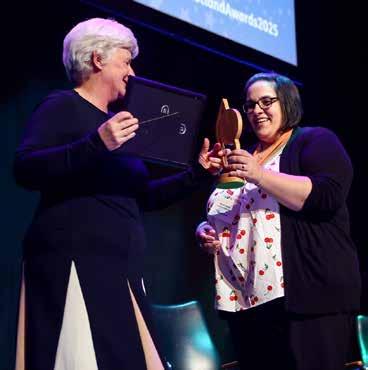
The Inspiration Award
Winner: HMP Shotts
District: Shotts
Pioneering group based in the prison HMP Shotts, dedicated to supporting an ageing population of prisoners in their care.

Community Champion
Winner: Bridget Donnelly
District: Greenock
Bridget is always going the extra mile for older people in her community, always looking out for them and keeping them connected and is very worthy of the Community Champion crown!


Nicola Whyte
Bridget Donnelly
HMP Shotts
Nicola receiving her award









Breaking down barriers in dementia
Conversations about dementia are not always easy, and in some communities the subject is rarely spoken about.
That’s why this summer, Age Scotland’s Dementia Team worked in partnership with The Economic Forum for Family Empowerment Scotland (TEFFFES) and Meeting Centres Scotland to build understanding across generations, strengthen inclusion and challenge the stigma surrounding dementia.
Running over five weeks, the collaboration included four interactive workshops with the Rising Stars youth group, involving around 20 young people aged five to sixteen. Guided by their own questions, including, “What is dementia?”, “How does it affect the brain?” and “Can people live well with it?”, the sessions combined discussion with creative activities. Young people coloured in brain maps, designed posters about communication and decorated memory boxes to explore how people with dementia can hold onto special moments. Alongside the youth sessions, a dementia awareness workshop for volunteers gave parents and community members the chance to build their knowledge and confidence. Ten participants took part, welcoming the opportunity to learn in a way that was clear, interactive and practical. As one volunteer commented, “I now feel more aware of dementia, and more confident about offering support.”

For Age Scotland, this was the first time delivering dementia awareness sessions directly to a youth group, and it was inspiring to see the level of curiosity and creativity the young people brought. Their enthusiasm helped shape the workshops and showed how powerful intergenerational awareness-raising can be. The project also connects to our wider diversity and inclusion strategy. By working alongside TEFFFES and Meeting Centres Scotland, we are learning directly from communities whose voices may not always be heard. These insights will inform our ongoing work with minority communities, ensuring our approach to dementia awareness continues to reflect Scotland’s diversity of cultures and experiences. This partnership is a powerful reminder of what can be achieved when organisations come together with a shared purpose: breaking stigma, fostering inclusion and empowering communities to support people living with dementia.
Find out more about our dementia work by visiting age.scot/dementia.

Rising Stars Youth Group Dementia awareness across generations
Read all about it - new information guides available
Our information team is constantly reviewing and updating our range of guides. So far this year, four brand new guides have been added to our library. Our information guides cover a range of topics relevant to later life, across categories including health and well-being, money, benefits and care. As well as keeping our existing guides updated, we do our best to refine and improve our offering. Here we discuss the most recent additions to our suite of over 70 guides.
Unpaid Carers of People Living with Dementia: Know your rights!
The guide is just one of the outputs of the Dementia Lived Experience Forum within Age Scotland’s Dementia team and was funded via a peer-topeer grant. It was written by and for people caring for someone living with, or showing signs of, any form of dementia. They hope that by sharing their experiences they can help others to access the support they are entitled to, at the right time.




Feeling
Lonely? Supporting you to feel more socially
connected
Loneliness can impact anyone, but with at least one chronically lonely older person for every street in Scotland, we know that older people can be most affected. This guide helps us to understand loneliness and how it can be tackled.
It includes details of our Friendship Service, which works to reduce loneliness. By mobilising a trusty team of volunteers, they provide older people with weekly telephone calls, support finding local activities, and fortnightly group calls based around shared interests.
Guide for Victims of Crime
Being victim to a crime can impact our confidence and our outlook on life. We sadly hear from people affected by crime who are trying to make sense of what to do next and where to turn. This guide provides information on the steps to take immediately after a crime, how to report a crime and where to get support in the aftermath.
Being Prepared: Power cuts, extreme weather and beyond
When disaster strikes, it is good to be prepared. This guide includes advice on everything from putting together an emergency kit to keeping on top of medical checkups and paperwork. It highlights the importance of looking after the small things to help build resilience for life’s bigger challenges.
For copies of any of our information guides, call the Age Scotland helpline on 0800 12 44 222 or visit age.scot/information.
Why we still need Pride in 2025
We travelled to LGBTQ+ Pride events across the country - Lochaber, Arran, Highland, Grampian, Fife, Edinburgh, Glasgow, Oban and Stirling. Our Diversity and Inclusion Officer, Keith Paterson, shares his personal story and reflects on why Pride events are just as important today as they were when they began.
Attending so many events made me think of my first Pride march, which was in Edinburgh back in 1995, making this year’s event the 30th Anniversary.
That march in Edinburgh was the first Pride march to take place in Scotland. When I came to Edinburgh at the end of the 1970’s it was ostensibly to go to university, but really, I was a small-town boy seeking “like-minded people”. I found them, but for another two years or so homosexuality was still illegal. The law did not change in Scotland until 1981.
Once in Edinburgh, I soon discovered the gay scene, which was still slightly hidden away, along with political organisations campaigning for LGBTQ+ rights. I volunteered on what was then Gay Switchboard, which was the first such service in the UK. They took their first calls the day before the London version.
It was then that I became more aware of our history, and met people on the switchboard, many of them older, who had been imprisoned, ostracised by their families, thrown out of the military, sacked from their jobs, beaten up and banned from attending their long-term partner’s funerals.
So, when people ask why we “need” Pride, I tell them some of those stories. I also say that for many people (and for some it hasn’t changed), they lived much of their lives hiding their identities.

To
come out and be visible wasn’t easy.
So, to celebrate openly and publicly is important, to remember all those folk who couldn’t. That’s why we need Pride.
Among people of my age in the UK, I think this is the first time in our lives we have felt there is a real threat to our hard-won rights being rowed back or removed. There were some blips along the way, like Section 28, but generally things have moved towards equal rights.
However, we look across the Atlantic with trepidation and fear. We see how our trans community is being treated. In 2016 Scotland was recognised as “the best country in Europe for LGBTQ+ legal rights”. This year, the UK fell back to 22nd place (out of 49).
And that’s why we need to keep flying the Pride flag high every year!
Our advice and information guide on the Rights of LGBTQ+ older people in Scotland can be ordered by emailing publications@agescotland.org.uk.
Call our free helpline on 0800 12 44 222 for general information, advice and support.

Age Scotland at Arran Pride
Keith and colleagues at Edinburgh’s Pride march
Let’s talk menopause in the workplace
In partnership with The University of Edinburgh Business School, we’ve designed workshops for line managers focused on menopause in the workplace.
Women over 50 are now the fastest-growing segment of the workforce. However, 10% of menopausal women with challenging symptoms end up leaving their jobs.
Niki Woods, menopause & midlife wellness educator, leads our workshops. We catch up with her to find out why so many menopausal women feel unsupported in the workplace and how managers can help. Why has the menopause been such a taboo subject for so long?
For generations, menopause was poorly understood, rarely discussed, and largely ignored in public knowledge, in education and healthcare. Cultural discomfort around discussing female bodies, a lack of education, and menopause’s association with the end of fertility have further contributed to the silence and stigma.
In many workplaces a lack of understanding, plus wider gender issues and male-dominated leadership has meant menopause was rarely acknowledged or supported until very recently, but it’s still a topic with significant stigma attached.
What are the main reasons for menopausal women leaving their jobs?
The main reasons are due to a combination of unmanaged symptoms and lack of support.
If women experience physical and cognitive symptoms such as hot flushes, anxiety, and brain fog this can make it challenging to perform at their best, which can feel very frightening and confusing. Many women also feel unable to speak openly about what they’re experiencing, fearing they’ll be seen as weak, unprofessional, or less capable. Menopausal symptoms can erode women’s confidence and contribute to a belief that they’re no longer competent, and often women feel they need to leave to avoid encountering problems.
Women in midlife are often dealing with the ‘collision’ of menopause, high pressure jobs, childcare and elderly parents with health issues. This can lead to burnout.
If workplaces aren’t felt to be open and supportive, and/or managers lack awareness or training around menopause this can also leave women feeling isolated or misunderstood.

Women over 50 are now the fastest-growing segment of the workforce
What
are your tips for women struggling with menopausal symptoms?
The first step is to acknowledge that what you’re experiencing is valid and that you deserve support. Educate yourself and keep track of your symptoms so you can identify patterns. Speak to your GP to explore treatment and support options and explore whether you could make any lifestyle changes - such as improving nutrition, exercise, sleep - to help you feel better.
At work, consider having an open conversation with your manager or HR to discuss adjustments that could help, such as flexible hours, breaks, or a cooler workspace.
Most importantly, know that you are not alone. Menopause is a natural phase of life and with the right strategies and support you can continue to thrive personally and professionally.
Why are our workshops beneficial?
Our workshops help demystify the menopause and open up conversations by giving an overview of symptoms, stages and impact, offering practical advice on how to support others, and explaining how to make simple but effective adjustments at work.
The manager training explains the legal context, so managers understand their responsibilities, and explores how to have effective conversations around menopause, so managers feel more confident to engage in conversations and support staff.
Find out more
To book an upcoming workshop with Niki email workshops@agescotland.org.uk.

Niki Woods, menopause and midlife wellness educator
Going the extra mile for older people
Our fundraisers really have shown that the sky is the limit this year, taking part in everything from abseiling down the Kelpies to marathons and firewalks, and their money has made a real difference to the lives of older people in Scotland.
It’s always heart-warming when dedicated fundraisers spare their valuable time to train and raise funds to help Age Scotland. All money raised goes directly towards supporting older people in Scotland who need it most.
Every one of our fundraisers has their own reasons for choosing Age Scotland. Some have witnessed the support the charity has given an older relative, others have read about our work campaigning and influencing on behalf of older people. We catch up with a small handful of our star fundraisers.

Chris, a community fundraiser said: “I wanted to choose a cause that holds personal meaning for me, rather than one of the more common charities.
“I ran the Edinburgh marathon to raise money for Age Scotland, an incredible charity. Having relatives in nursing homes has given me a deep appreciation for the challenges involved in providing care.
“I’ve witnessed the incredible dedication of staff throughout the years who go above and beyond to support older people and improve their quality of life. Beyond that, Age Scotland provides vital support to older people, their families, and carers through advice, community initiatives and advocacy.”
Around 50 amazing fundraisers also abseiled down the Kelpies to raise vital funds for older people. Four Network Rail colleagues Angela, Rebecca, Sameena and Lorne took part.
Angela said: “Taking part in the Kelpies experience was unforgettable and knowing the funds raised will bring smiles to others makes it so worth it.


Angela Inglis at the Kelpies
Chris and his medal
Sean swapped his driving seat to jump on the saddle
“So, if you have ever thought about doing something bold for a good cause, I highly recommend taking the plunge. It’s fun, it’s meaningful and you’ll meet some fantastic people.”
Sean Kennedy, a ScotRail train driver swapped high-speed train travel for pedal-power by taking on a 120-mile static cycling challenge to raise money for older people. He completed the equivalent of a round trip from Queen Street to our office in Edinburgh and is already planning his next fundraising challenge for us! Moreover, Sean’s super colleague Nicola Whyte, also scooped Fundraiser of the Year at our awards. Read more on page 16.


Get involved
If our fundraisers’ stories have inspired you, sign up to an event or create a fundraiser of your own. Visit age.scot/fundraise or email fundraising@agescotland.org.uk

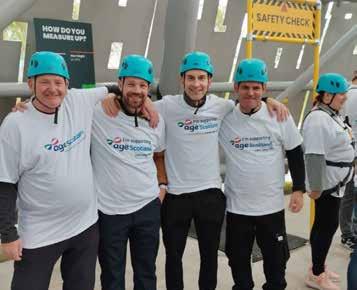
Around 50 fundraisers took on the Kelpies
Staying creative with age
At Age Scotland, we’re lucky enough to be surrounded by talented and creative members and staff.
In summer, some Age Scotland colleagues attended the U3a West End Glasgow Showcase Meeting. Jean Marshall, who is part of the Creative Writing group, read her poem written in Scots Doric and had the room enthralled.
Jean grew up in Aberdeenshire but moved away, returning there in 1986 with her husband and two daughters and remaining there until 2021. She then moved to Glasgow when her husband died. She said:
“In Glasgow I set about constructing a new life with U3a, volunteering, leisure activities and a few new close friendships.”
Jean wrote the poem after experiencing a health scare in 2023, she added:
“I am better now but I look at things a bit differently. I can’t remake the life I had. I need to be my own ‘foundation’ if that makes sense and take things as they come. But make the most of life too!”
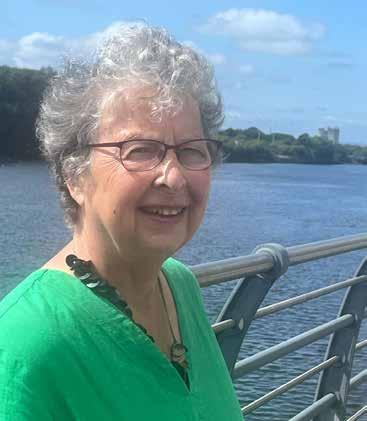
Moving On
My tongue aye tells on me. It clypes: ‘Ootsider’. So folk aye ask : ‘Far are ye fae?’
I am content tae say: ‘The North East’.
Nae birthed but brocht up under its wide skies o’er drilled parks. A rain shadowed land wi summer beaches and hard sparkly steen fae the bedrock. Made by man intae the grey granite city Aberdeen.
Firm foundations for a solid life. But lives like rock get blasted. Shards fracture further. I thought tae try a new life So I left.
Now I bide high aside the river. But on ground mair easily eroded. My first constructions collapsed. Pillars moved, planks, keystanes swept awa by a diagnosis. There is nae granite here.
I watch the water. The river aye renews. It canna ging back. So let me clamp like a crustacean ontae flotsam. Let me command a cliché ,find a flow. I will try and let myself just go.

Jean Marshall
Karina Vidler, our Veterans’ Project Assistant, helps coordinate the Unforgotten Forces Consortium and Age Scotland’s support for veterans. Karina recently had her poem about making the most of life in later years published in best-selling Under the Radar Magazine – a publication spotlighting the best up-and-coming and established poets and writers. Enjoy reading it!

Learn with Giacomo
And indeed learning this term has been fun, my lovely new zoom Italian tutor.
I didn’t expect to learn the verb limonare which means kissing with tongues or how having un altro would mean you taking another lover alongside your boyfriend.
For an hour and a half on Monday evenings you blow the dust off this gaggle of older women exquisitely understanding our learning needs uploading videos for us of Marco Mengoni singing passionately of frustrated love in black leather, his muscles honed in the gym.
Stylish in your pastel tone sweaters, tanned after your weekend in Venezia you tell us how you drive a motorbike and I think maybe there’s still time for life that I should perhaps be more like the Italians, who speed up when approaching a red light.

Find out more
Our Community Connecting service aims to link older people across Scotland up with organisations offering social activities, health and fitness groups, and events.
Find out more by calling our helpline on 0800 12 44 222.
Karina Vidler
Enjoy a brain workout
The belief that challenging our brains through stimulating activities like learning something new or connecting with others makes a lot of sense – if we want our brain to stay in peak condition, we should use it.
Age Scotland has a rich history of collaboration between Heriot-Watt researchers, particularly through initiatives led by Professor Alan Gow and the University’s wattAGE network which focuses on translating cutting-edge research into tangible benefits for older citizens.
Alan Gow is a Professor in Psychology at HeriotWatt and researches how our thinking skills change as we age. He states that for activities to be effective in maintaining or improving our thinking skills as we age, they might need to challenge us in new ways according to studies. That is, the most beneficial activities for us in later life might be doing things we’ve never done before. There are good reasons for taking up entirely new activities – benefits such as increased engagement with other groups of people and the development of new skills.

Tips on how to keep your brain active:
Engage in physical exercise
Regular aerobic exercise is beneficial for cognitive ability, while resistance training helps with memory.
Practice brain exercises
Activities like learning new skills can boost memory.
Stay mentally stimulated
Read books, play musical instruments, or engage in discussions to challenge your thinking.
Get enough sleep
Quality sleep is essential for cognitive function and memory consolidation.
Maintain a healthy diet
Foods rich in antioxidants, healthy fats, and vitamins can support brain health.
Order a copy of our Health and Wellbeing guide for later life to read a section on brain health and ways to find new interests at age.scot/information or for a paper copy call 0330 323 2400.
Boost your brain
If you’d like to boost your brain health and make movement part of your daily life, then join one of our fun How to Age Well interactive sessions.
Find out more and book by emailing healthandwellbeing@ agescotland.org.uk.
Professor Alan Gow
Why not put your brain to the test right now with our winter-themed crossword
Down
1. Delivers a speech on Christmas Day (4) 5. You wear on your feet to stay dry (7) 8. Climbs down the chimney (5) 9. Red-nosed reindeer (7) 10. Something scented you light (6)
2. Wear these on your hands to stay warm (6)
3. Christmas chocolates in a tub (13)
4. Animals do this during winter (9)
6. Tree topper (4)
7. Scots word for New Year’s Eve (8)
Answers on page 31
HomeSight: tackling loneliness and powering reassurance services for homecare
Age Scotland is pleased to be able to offer a discount to its members on HomeSight, a new approach by Advanced Technology Solutions (ATS) designed to help older adults maintain wellness and independence, improve social connection with their friends and families, and help service providers address the pressures of ever-increasing demand.
What is HomeSight?
HomeSight is a quietly powerful approach to connected care that uses the device older adults already know best — the television — to improve social contact and passive monitoring. By bringing video calls, messages, medication prompts and sensor-driven wellbeing data to the TV, HomeSight reduces friction for people who are isolated or unfamiliar with smartphones and tablets.
Who is it for?
For older adults living alone, the mental-health impact of simple, regular human contact is profound. HomeSight’s push notifications, photo sharing and scheduled video check-ins create low-effort social touchpoints that interrupt long hours of solitude with predictable, familiar interactions. Because the system can also collect anonymised activity and vital-sign data from connected devices, it helps families and care teams spot changes in routine that often precede loneliness-driven declines (missed meals, less TV use, less movement) — enabling earlier, human-centred outreach.
For domiciliary care providers, HomeSight can be reframed as a reassurance-delivery platform. Rather than replacing visits, it augments them: care teams can use the system to deliver brief wellbeing calls, confirm medication adherence, triage concerns remotely and prioritise in-person care where it’s most needed. This hybrid model reduces unnecessary travel, supports more frequent checkins, and offers auditable records that prove a welfare contact occurred — all useful for providers working to balance quality and cost.

Novelty and ease of use
HomeSight’s novelty is not in inventing new sensors, but in weaving existing technologies into a single, TV-first experience that respects older adults’ habits. That design choice is both simple and strategic: it minimises training, increases adoption, and keeps the interaction dignified and frictionless. The platform’s integration with third-party health devices and cloud analytics gives providers clinicalgrade signals without complex installs for users.
Early real-world uptake
Community providers are already putting the idea into practice. Baillieston Community Care in Glasgow has announced a partnership to trial HomeSight devices across people’s homes and in care settings, running pilots to test wellbeing check-ins and family connection features. These early deployments show how a modest number of TV-based hubs can scale reassurance services while keeping the person at the centre.
To learn more visit bailliestoncommunitycare.co.uk
You can start using HomeSight now!
HomeSight’s blend of familiarity, passive sensing and provider-facing workflows makes it a practical tool for reducing isolation and for delivering reassurance at scale — a welcome middle path between low-touch tech and intensive in-person care.
Whether you’re a care provider, family member, or part of a community organisation, HomeSight could be a game-changer.
• Contact info@atsolutions.uk for member discounts
• Share this with someone who could benefit from HomeSight
Let’s make loneliness a thing of the past — one screen at a time.

Winter themed crossword answers: Across 1- King 5- Wellies 8- Santa 9- Rudolph 10- Candle Down
Gloves
Quality Street
Hibernate
Star 7- Hogmanay



